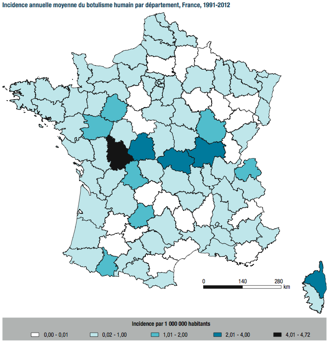Homemade or homemade food preparations are the most at risk of transmitting botulism, a serious neurological condition, but which remains rare.

Undercooked or poorly prepared food can cause a rare but serious neurological condition: botulism human. This disease, which is characterized by flaccid paralysis, can be caused by preserved vegetables that are slightly acidic, fermented, salted or smoked fish, and cold meats. In its weekly epidemiological bulletin (BEH) of February 19, theHealth Watch Institute (INVS) takes stock of the disease between 2010 and 2012. Half of the patients treated for botulism were hospitalized.
During the follow-up period, 51 cases were reported. Most often, these were isolated cases (68% of outbreaks). The BEH nevertheless highlights 2 cases of infant botulism in babies of 3 and 5 months. The Canadian Ministry of Health has just launched an alert on February 18. It was recalled that a child under 1 year old should not consume honey, which promotes contamination. THE’Health security agency (ANSES) issued the same recommendations last August, even though infant botulism remains extremely rare in France.
Often food contamination
The vast majority of human botulism cases are linked to food contamination. First culprit: family or artisanal preparation. But “the outbreaks of botulism caused by a marketed product (…) all included very severe cases” indicates the BEH. “The food most often in question was a ham of family preparation or artisanal (44% of the households whose origin was identified)”. Ham is traditionally responsible for botulism in France. It should be noted that the departments of central France, where we traditionally consume charcuterie products of this type, are the most affected by botulism.

The main manifestations of human botulism are double vision and difficulty swallowing food. Dry mouth and vomiting are often cited by affected patients. A majority of them report at least one digestive sign (nausea, vomiting, abdominal pain, diarrhea).
.

















